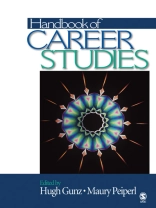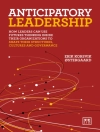The Handbook of Career Studies brings together, for the first time in a single work, a comprehensive scholarly treatment of the major topics within the growing field of career studies. Drawing on the expertise of leading international scholars in each area of career studies, editors Hugh Gunz and Maury Peiperl have assembled a consummate set of writings, defining the field with a breadth of coverage and integration of topics not found elsewhere. From a view of the history of the field and a map of its elements to a set of essays about the future of careers and work, this volume provides the most complete reference available on the role of work careers in individual lives, institutions, and industries.
Key Features
• Offers a comprehensive history and structure of the field: Building on previous work done in the discipline, the editors and contributors take a fresh look at the origins and current structure of career studies.
• Presents the most complete review of research available: An unparalleled set of prominent global contributors describes the state of work in their areas of expertise as well as offering a glimpse at future trends.
• Extends subject area knowledge to other disciplines: By linking career studies to a wider set of disciplines through critical essays, this volume thoroughly explores future directions for career research, policy, and practice.
• Includes an endorsement and critical comments on the state of the field: Edgar H. Schein, widely acknowledged as a seminal contributor to the modern field of career studies, provides a Foreword and a critical Afterword.
Intended Audience
This Handbook is an invaluable reference work for students, academics, and researchers in the areas of Careers, Industrial and Organizational Psychology, Social Psychology, Counseling, Sociology, and Organization Studies as well as for human resource practitioners interested in the state of knowledge of the field.
Cuprins
Foreword: Career Research–Some Personal Perspectives – Edgar H. Schein
Preface
1. Introduction – Hugh Gunz and Maury Peiperl
Part I: The Historical Origins and Current Structure of the Careers Field
2. Tracing the Historical Roots of Career Theory in Management and Organization Studies – Celia Moore, Hugh Gunz, and Douglas T. Hall
3. Taxonomy of Career Studies – Maury Peiperl and Hugh Gunz
Part II: Main Currents in the Study of Career
Section 1: Careers and the Individual
4. Personality and Career Success – Timothy A. Judge and John D. Kammeyer-Mueller
5. Occupational Choice – Mark L. Savickas
6. Career Counseling – Jennifer M. Kidd
7. The Subjective Career in the Knowledge Economy – Svetlana N. Khapova, Michael B. Arthur, and Celeste P. M. Wilderom
8. The Intersection of Work and Family Lives – Jeffrey H. Greenhaus and Sharon Foley
9. Late-Career and Retirement Issues – Daniel C. Feldman
10. Organizational Challenges at the Periphery: Career Issues for the Socially Marginalized – Pushkala Prasad, Caroline D′Abate, and Anshuman Prasad
11. Customized Careers – Monique Valcour, Lotte Bailyn, and Maria Alejandra Quijada
Section 2: Careers in Context
12. Contextual Issues in the Study of Careers – Wolfgang Mayrhofer, Michael Meyer, and Johannes Steyrer
13. Mentoring and Developmental Networks in the New Career Context – Dawn E. Chandler and Kathy E. Kram
14. Networks and Identities: Reciprocal Influences on Career Processes and Outcomes – Herminia Ibarra and Prashant H. Deshpande
15. The Developmental Theories: A Critical Examination of Their Continuing Impact on Careers Research – Sherry E. Sullivan and Madeline Crocitto
16. Living to Work–Working to Live: Conceptualizations of Careers Among Contemporary Workers – David E. Guest and Jane Sturges
17. The Institutions of Outside Hiring – Peter Cappelli and Monika Hamori
18. Global Careers – Maury Peiperl and Karsten Jonsen
Section 3: Careers and Institutions
19. Career Systems and Psychological Contracts – Holly S. Slay and M. Susan Taylor
20. Organizational Demography and Individual Careers: Structure, Norms, and Outcomes – Barbara S. Lawrence and Pamela S. Tolbert
21. Career Patterns and Organizational Performance – Monica C. Higgins and James R. Dillon
22. Careers and Institutions: The Centrality of Careers to Organizational Studies – Candace Jones and Mary B. Dunn
23. Careers Across Cultures – David C. Thomas and Kerr Inkson
24. Boundaries in the Study of Career – Hugh Gunz, Maury Peiperl, and Daniel Tzabbar
Part III: Synthesis
25. Designing Career Systems: Are We Ready for It? – Silvia Bagdadli
26. Considering the Darker Side of Careers: Toward a More Balanced Perspective – Yoav Vardi and Sharon H. Kim
27. Continuity, Emergence, and Opportunities for Convergence – Maria L. Kraimer and Scott E. Seibert
28. A Complexity Perspective on Intentional Change in Careers – Richard E. Boyatzis
29. The Catalytic 1970s: Lessons for the 2000s – C. Brooklyn Derr and Jon P. Briscoe
30. Career Studies: Personal ‘Side Trips’ – Philip H. Mirvis
31. Trends, Paradoxes, and Some Directions for Research in Career Studies – Wayne F. Cascio
32. The Meanings of Career – Audrey Collin
33. Destiny, Drama, and Deliberation: Careers in the Coevolution of Lives and Societies – Nigel Nicholson
Afterword: Career Research–Some Issues and Dilemmas – Edgar H. Schein
Author Index
Subject Index
About the Editors
About the Contributors
Despre autor
Maury Peiperl is Professor of Leadership and Strategic Change at IMD.
His areas of interest are organization development, executive careers, change management, HR strategy, and global mobility.
Professor Peiperl has taught, researched, or consulted in these areas in 25 countries on four continents, and is dedicated to promoting the role of business in sustainable global development and in the resolution of cross-national conflict. His current work focuses on the development of global executives and the management of careers under long-term uncertainty.
Maury Peiperl is co-author of the leading textbook on change management, Managing Change (Mc Graw-Hill), as well as two books on careers and work, Career Frontiers and Career Creativity (Oxford) and the central reference in the careers field, The Handbook of Career Studies (Sage). He has also published in Harvard Business Review, Academy of Management Review, Human Resource Management, and Group and Organization Management, among others.
Outside his research and teaching, Maury Peiperl sits on the boards of several companies. He serves on the Alumni Council of the Harvard Graduate School of Arts and Sciences and is active in the Academy of Management, where he served as Chair of the Careers Division. He spent three years on the Academy’s International Programs Committee and has been recognized on numerous occasions for his service to the Academy.
Before becoming a professor, Maury Peiperl worked for IBM, Merrill Lynch, and LEK Consulting, and as a research fellow at Harvard Business School. From 1992 to 2004, he was a professor at London Business School (UK). He has also held visiting or affiliate appointments at the University of Maryland (USA), HEC (France), and Templeton College, Oxford (UK). While at London Business School, he developed and served as Associate Dean of the EMBA Global Programme in partnership with Columbia Business School in New York. He also created the popular elective courses “Managing Change” and “The Global Business Leader”, and the top-rated executive program “Leadership for Change”.
Professor Peiperl has directed programs for numerous clients including Adecco, Deloitte, CCHBC, EDS, Glaxo Smith Kline, Nortel Networks, Rentokil Initial, and UPM, and has designed and taught collaboratively with a range of corporate, government, and university partners.
Professor Peiperl holds a BS in Engineering from Princeton University (USA), and an MBA, AM, and Ph D from Harvard University (USA).












